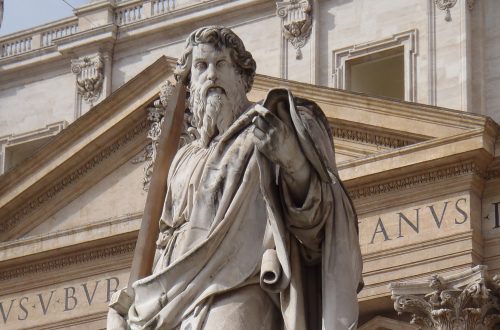The current issue of the Criswell Theological Review is making the rounds in the blogosphere (here, here, here, here, here, here, here, here, here . . . just to name a few). As I indicated in my previous post, some of the articles are already available to download for free.
One of the interesting things about this issue is that at least two of the contributors, Mark Driscoll and John Hammett, have decided to use Ed Stetzer’s tripartite scheme for describing emerging churches: Relevants, Reconstructionists, and Revisionists.
Here’s how Driscoll breaks it down in his CTR article:
Relevants are theologically conservative evangelicals who are not as interested in reshaping theology as much as updating such things as worship styles, preaching styles, and church leadership structures. . .
Reconstructionists are generally theologically evangelical and dissatisfied with the current forms of church (e.g. seeker, purpose, contemporary). . .
Revisionists are theologically liberal and question key evangelical doctrines, critiquing their appropriateness for the emerging postmodern world (CTR 3.2, pp. 89-90)
Driscoll associates Dan Kimball, Don Miller, and Rob Bell with the Relevants. He associates Neil Cole, Michael Frost, and Alan Hirsch with the Reconstructionists. And he associates Brian McLaren and Doug Padgitt with the Revisionists.
The provocative claim associated with this last category (the Revisionists) is that Driscoll charges them with heading in a heretical direction (CTR 3.2, p. 91). As near as I can tell from reading Driscoll’s essay, he believes McLaren and Padgitt represent a dangerous and unorthodox strand of emergent leaders.
His evaluation of the three types of emerging churches is instructive:
If both doctrine and practice are constantly changing, the result is living heresy, which is where I fear the Revisionist Emergent tribe of the Emerging church is heading. But, if doctrine is constant and practice is always changing, the result is living orthodoxy which I propose is the faithful third way of the Relevants, which I pray remains the predominant way of the Reconstructionists (CTR 3.2, pp. 90-91).
I expect that we will see much more of this tripartite division in future descriptions of emerging churches, even though emergent-folks on the Revisionist side of the spectrum are likely to offer strenuous objections. Nobody likes to be pigeon-holed, but I think this is a fair categorization.
As a heuristic device, the scheme is most profitably used if it is conceived as a spectrum rather than as three distinct and mutually exclusive categories. I think it is fair to say that most emerging churches probably fall somewhere along this spectrum. This is probably the best way for us to talk about a movement that is very theologically diverse.




13 Comments
Gaddabout
Thank you for the link. As someone who is interested in the interaction between theology and culture, I find academic publications such as this one immensely helpful.
I pray I maintain charitable with those with whom I strongly disagree.
Anonymous
Denny,
I have always wanted a “tripartite scheme.” Grin.
Thanks for the kind words… and let me say that I do see it as an overlapping continuum that I make clearer in my book. I just did not have the space to in the BP column.
Keep up the great work, Denny. You are blessed to have Jerry Johnson there with you. At SBTS, he was always the smartest guy in the room (except when Mohler visited), so I am glad we are not in the same room anymore… grin. But, I do miss our interaction and his insights.
Thanks for your thoughtful look at this important issue. We need more.
God bless,
Ed Stetzer
Michael
Does Robert Webber get no attention because he is over 50?
His *Ancient-Future* series and *The Younger Evangelicals* is hands down the best stuff out there related to the emerging church issues. I would think that a former theology prof from Wheaton would recieve more attention by the emergents and those opposed. He definetly deserves it.
BTW, thanks for posting your ETS paper. One question, maybe not so much to you, but to Grudem, why should we limit our reading to the works of fellow evangelicals?
Denny Burk
Michael,
We definitely should not limit our reading in that way. That’s one point of Grudem’s that I would certainly want to qualify, though I didn’t in the paper.
Thanks,
Denny
blake w
Thanks for the link! This should be good. I enjoyed the paper and it was nice to meet you.
Bruno W
The problem with Driscoll’s statement is that doctrine has and does change as well (slightly as it may be). As the sciences uncover new observations, we need to adjust our doctrine in light of scripture and new scientific discoveries. We’ve been doing this for 2000 years so this shouldn’t be anything surprising.
LeRon Shult treats this fact and continued need excellently in his new book Reforming the Doctrine of God.
Mark
Excellent post and links Denny!
Thanks,
scott zeller
Denny, thanks for the great journal and for dropping by the blog.
Bruno, I would say that Driscoll is right in that doctrine remains the same (that it was “once delivered to the saints”) and what changes is our expression of it through our words and practices in our specific times and cultures. I think that is a more accurate expression of what we’ve been doing for 2000 years. What do you mean when you say we “need to adjust our doctrine”?
SEZ
Bruno W
Doctrine isn’t merely an expression of belief, but also a formulation of it. We interpret scripture (which doesn’t change) in light of what we know (for example) scientifically. When Galileo observed that the earth wasn’t in fact the center of the universe, that radically changed the churches understanding of what it meant for humans and the earth having special significance in the eyes of God. A faculty psychology informed how we viewed the make up of humans for several centuries. Now, seeing that there are huge problems with faculty psychology, many theologians are moving away from dichotomist or tricotomist views of humans. These are just a couple of examples concerning how doctrine changes in light of various discoveries in science or philosophy.
So in light of this, my view is that theology always need to be reformed while maintaining the deeply held biblical intuitions we see in the scriptures.
Again, Shults in his new book examines this need in depth. I love what he says here: “The great theologians of each generation have realized that merely repeating particular formulations inherited from previous generations would serve only to preserve the gospel by petrifying it. Fear can easily drive us to treat our theological propositions as fossils, unearthed from a privileged period in church history and placed in an ecclesiastical museum, quarantined from the polluted air of cultural anxiety that might contribute to its deterioration.”
Reforming the Doctrine of God, 201
I really believe that we need to remember that we haven’t “finally” figured how everything is supposed to work. Or that the Puritans (for example) really had it perfect and we just have to reapply what they taught. Our task is to continue to walk in faith, trusting the promises of God, as he contiues unfold for us his awesome splendor and adapt our understanding in light of these new discoveries, yet always remaining true to his revelation.
Darren Larson
Denny,
I am very thankful that Criswell Journal took the time to help readers process the emergent church. Young pastors need to think and pray through the implications of the movement if they decide to classify themselves as emergent. Driscoll’s (borrowed) categories are helpful in this regard. I’ve seen too many simply call themselves emergent because it’s sexy… and everyone wants to be sexy!
I hope and pray pastors (me included) look to the Bible first, and let scripture define culture as opposed to the other way around.
Darren
revnace
I’m too sexy for your…
I believe Shultz would reject any category you choose for him, since there is no spoon.
andrew jones
i also found it interesting that Mark embraced Ed’s 3 categories – they seem to be gettting verification from a lot of people who may want to draw some lines.
Len Sweet also had 4 helpful categories in “The church in emerging culture” using the analogies of garden, park, glen and meadow.
Jaja Skywalker
I find it of interest that McLaren has a stronger literature background than theological.
[ …he graduated from University of Maryland with degrees in
English (BA, summa cum laude, 1978, and MA, in 1981). His academic
interests included Medieval drama, Romantic poets, modern
philosophical literature, and the novels of Dr. Walker Percy. In
2004, he was awarded a Doctor of Divinity Degree (honoris causa) from
Carey Theological Seminary in Vancouver, BC, Canada.From 1978 to 1986, McLaren taught college English, and in 1982, he
helped form Cedar Ridge Community Church ]
I’m not an expert, but I have heard it serveral times that relativism is found strongest in literature departments.
PS. Chuck Norris doesn’t use spellcheck.